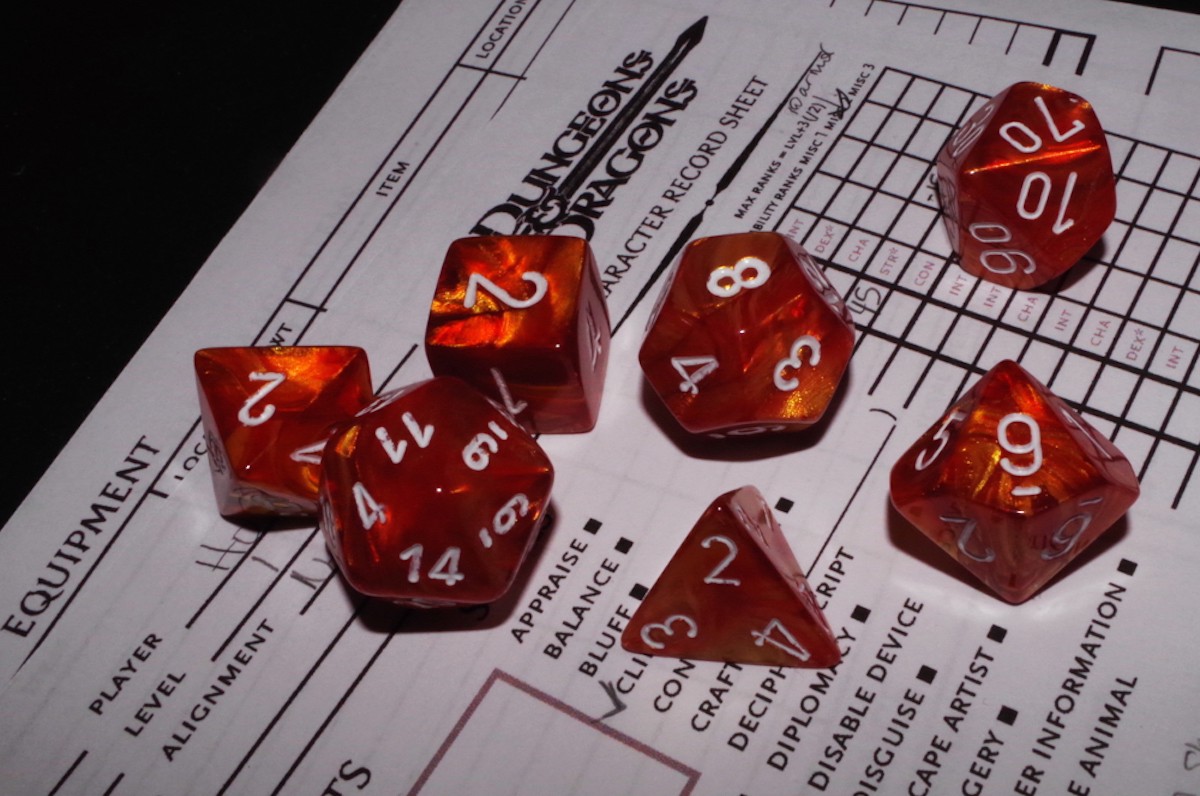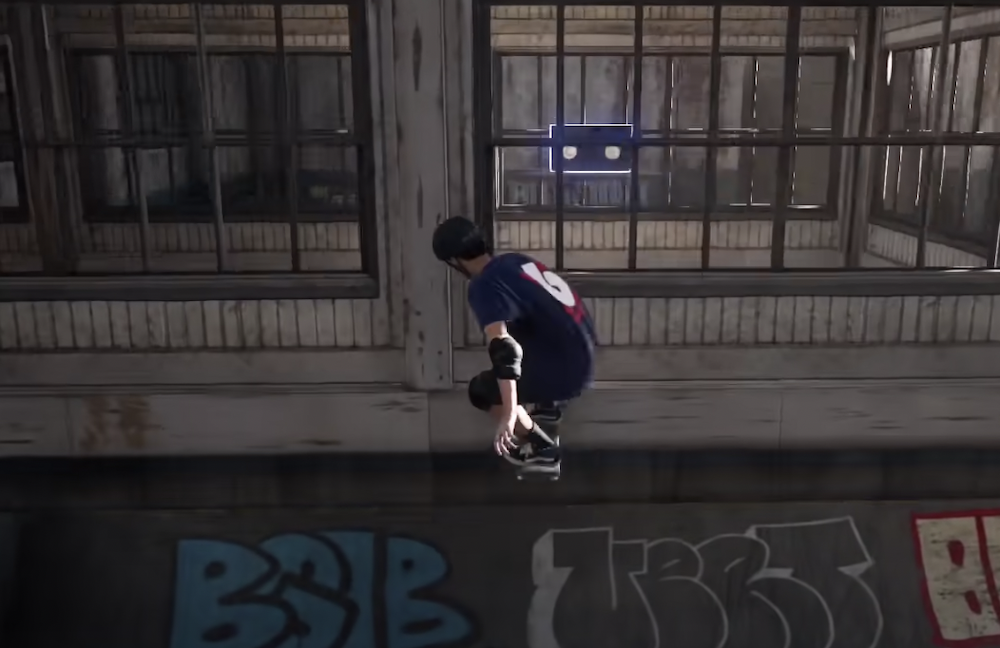interviews
Why All Writers Should Play Dungeons & Dragons
Roleplaying games, once considered nerdy, are getting popular—and for writers, readers, and storytellers, they’re full of potential

For decades, friends have collected in basements to fight zombies and goblins, find enchanted treasure, and save countless realms — armed only with paper and dice. This is Dungeons and Dragons , the roleplaying game that has swept nerddom by storm. But at its core, D&D is a device for storytelling, an oral tradition of collaboration and cooperation, crafting some of the most epic tales of the modern era.
Dungeons & Dragons (D&D for short) is a roleplaying game, meaning each player inhabits one character. Players improvise actions and invent plot while acting as their characters, rolling a die, usually a 20-sided die, to see if they are successful. Every character has strengths and weaknesses, which add or subtract numbers from the player’s dice rolls; a muscle-bound fighter may have an easy time picking up massive boulders, say, but they’ll ruin tense political negotiations with their low charisma. Embarking on adventures together, the party interacts with the world’s people and each other. They solve problems, fight evil, and discover treasure and knowledge. The game runs smoothly with the guidance of a Dungeon Master (or DM), who acts as the game’s referee and storyteller, maintaining the setting and world where the adventures happen and playing the role of the people in the world.
The producers of the D&D podcast Join the Party — Eric Silver (the DM), Amanda McLoughlin (moon elf rogue Inara Harthorn), Brandon Grugle (warforged barbarian TR8c), and Michael Fische, aka Fish (half-elf warlock Johnny B. Goodlight) — sat down to talk about the relationship between the game and novels, the fears behind writing and playing, and what D&D can do that that reading and writing can’t.
Amanda McLoughlin: Fish, did you play D&D as a kid?
Michael Fische: Kind of. My brother and I, before we knew it had a name, would sit in my bedroom and we would tell stories to each other. And I would make up, because I didn’t have dice, elaborate ways of inducing chaos to whatever story we were telling. So my brother’s character would walk down the trail in the woods and I would have a chart where I would close my eyes, move my hand, place it down on paper and that would be what happened.
Eric Silver: That’s some Betrayal at the House on the Hill shit. Oh god.
Brandon Grugle: I feel like if I played with my little brother, it would just be like, “Oh, you die, I win!”
MF: Oh no, don’t worry, he died a lot.
AM: Why was that a lot more fun than just telling a story?
MF: It kept both of us on our toes. It meant that, even if I wanted us to do something, it wasn’t guaranteed to happen. There were so many different possibilities — he would have to make up what his character was doing, and I had to be ready to deal with whatever craziness he started.
ES: Which is what I have to do now as our Dungeon Master!
MF: Right. The game evens the playing field between the story creator and story consumers. I think if you imagine the Dungeon Master to be an author and D&D players to be characters within the story, you see how D&D gives the characters a power that they wouldn’t have in any other story. Roleplaying game characters have more power over what’s happening and their own destinies than they ever would in a typical fiction story.
Roleplaying game characters have more power over what’s happening and their own destinies than they ever would in a typical fiction story.
AM: It’s the most extreme example of your characters coming to life as a writer. When you’re writing a narrative, you feel sometimes that your characters have agency of their own — like they’re going to make decisions for themselves. But, for me, it’s really freeing not to get particularly attached to one way of doing things. I always get so overwhelmed with possibility when I’m writing that I can’t commit to one setting. Or I commit to one, then get buyer’s remorse and try to introduce flashbacks or parallel universes to cram those unused settings in there.
BG: Oh yeah, me too. My favorite books as a kid were choose-your-own-adventure books where the ending was always unpredictable. That was built into the story. And that’s why I got really interested in D&D, because there’s no possible way for me to know what’s next. I can’t force my way into the story like that.
AM: When I played pretend with my siblings I was very prescriptive: “This is what you do now.” I was dictating how they were playing in the universe. But on the other extreme, I would also get bored working on theater shows where the same thing happened every night. Unlike actors, I don’t get the idea that you can discover new meaning every night. Actors’ know what to say next, but also kind of feel through that decision or revelation for the first time over and over again every performance. I would just get bored running the same lighting cues over and over again. But in D&D, when you all sit down together, you know nothing is going to go the way anyone thinks. We’re making the magic together. There isn’t a script to follow. It’s the best compromise between “Here is a blank page, good luck!” and “Here is a script you have to follow.”
MF: The more I’ve played D&D the harder it’s been to read fantasy books, because I could just be playing it instead! I could be plotting and making decisions as the DM or as a character, shaping the world to make it more interesting.
AM: And the dice are that crucial element of chance, making you introduce conflict. As a writer, I’m too soft-hearted to make characters suffer. I love them too much! I just can’t bring myself to do it! But in a game, it would be so boring for nothing to happen — though of course there’s no way nothing would happen, because the DM is going to keep the action moving along. Then chance is going to decide for you if things succeed or not. I love that it’s not up to me to decide if my character fails or succeeds at something. I can roll with the rolls — listen to the dice, adapt to the outcome, and figure out how to make it work within the story.
ES: I mean, writing fiction is scary. Not only for all the reasons that we’ve been saying, but because the entire narrative is in your hands. If I had the choice for my characters to tell me what they would want to do, that would be AMAZING. Playing D&D together is doing that — shaping the plot — as a collaboration. I love this idea that you’re playing within a structure of a game, but everyone is working together to create a story, even as enemies and conflicts are being thrown out in front of you.
You’re playing within a structure of a game, but everyone is working together to create a story.
BG: If authors could choose to have their characters come to life, wouldn’t they choose that every time?
ES: EVERY time. Your creation is your baby anyway. Give them actual human form and… Imagine interacting with some of these flat, two-dimensional characters in real life or in the game? The hero who is only good and sees morality in black and white would die in three days in the real world.
AM: Or you would be the most boring person at your session! We all want to make a great story and to entertain each other. I think that makes us make our characters act a little more like people than you would on a page. If someone acted to type, acted totally predictably, we would get bored. If I could predict what your character would do every time? That would be so boring!
BG: But it’s not just on one person to carry that story. Splitting up responsibility forces everyone to be better. When you put four people in a room who are trying to have the most fun and most exciting time, it forces everyone to be their best.
AM: Which is quite unlike sitting at your desk writing a story, hoping someone, someday, will find it exciting. In our games I know right away if a joke falls flat, and I know if I make an exciting choice when I see your faces light up. It is instantaneous feedback.
MF: And if we were playing the game and everything was just falling flat, we could close the book, come back a week later, and start a whole new campaign. It could even be something other than fantasy. But when you write a book or a script or a play, you won’t know for months or years if something’s good. That immediacy is important, and D&D lets us apply it to our storytelling. It just makes everything dynamic and fun.
AM: But we’re not hanging each other out to dry, either. It can be funny to watch someone scramble during an improv night, but not so much when you’re sitting at a table together. The more I play, the more I realize the best part of playing is when I’m not saying anything. The best part is watching it all unfold in front of me.
ES: Since no player is trying to impress an audience, everyone has their own ideas and goals coming in. It’s the collision of everyone’s thoughts that make this thing complex. Have you ever read a novel where you knew exactly what they were trying to get at on the first few pages? Like “Oh wow, this a really cool critique of capitalism.” (Everyone laughs) “I’m excited to read 300 pages about how capitalism is bad.” But when everyone’s ideas are coming together, trying to get what they want, that’s very beautiful. It challenges the story.
When everyone’s ideas are coming together, trying to get what they want, that’s very beautiful. It challenges the story.
AM: It’s also challenging to step into for the first time, though.
ES: There is a steep learning curve when you bring people in and try to get them to play D&D, or if people investigate it on their own because they saw it wherever. But it is no steeper than trying to start any other creative project. How many times have you written four or five pages and threw them out because they were trash? I’d much rather start a scary new project within a community that’s trying to get everything to gel together, because then at least you have something. I mean, it’s a little harder for us because our learning and growing pains are on microphone. But I’d much rather have growing pains than so many five- or ten-page chunks of novels I haven’t started.
MF: Right, you can mold the story into something else if it’s not working.
AM: The game can be tailor-made for you but also surprising at the same time. It’s not a boring book where I can’t get past the first chapter and try again and again, and I’m continuously bored. Like, if that’s the case in D&D, then I’ll run out of the castle and try to seduce the barmaid.
ES: CLASSIC AMANDA.
AM: Listen, guys, gotta borrow from real life to make good character choices.
ES: The stories we make also hold up later. It’s not just this insular thing that only the people around that table can enjoy. I don’t know if every D&D game would hold up as a novel since there’s so much acting involved, but fans can flock to other people’s games when they’re adapted in a smart way to auditory or visual mediums.
D&D requires you to imagine yourself in the stories you consume.
MF: The way technology is now, you can watch a group play on YouTube or listen to a real play podcast and then go play a game of your own later that afternoon.
AM: That’s a perfect point to end on. You can listen and get inspired and play that same afternoon, which is kind of open and daring. D&D requires you to imagine yourself in the stories you consume. It’s so natural to want to participate in the stuff that you think is awesome. That was so easy to do as a kid — every kid writes fan fiction of some kind, or plays pretend in the universe of their favorite movie, or dresses up like Buzz Lightyear at school. And this is, I wouldn’t say a grown-up way to do it… it’s just a more structured and communal way to play pretend and still challenge yourself. We’re maintaining that spirit of play and saying, yes, I have a right to shape the stories that I consume. It’s nothing but awesome.
Ready to try a game of your own? Listen to Join the Party’s Beginner Episodes (part 1 and part 2) to learn the basics before diving in yourself.








